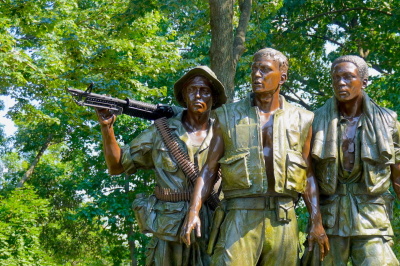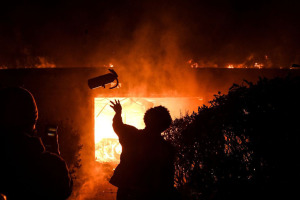My soldiers taught me what love looks like

November 11 is Veterans Day.
I am a proud, Cold War-era veteran of the U.S. Army Field Artillery. I am not a combat veteran, and my hat goes off to those who have served under fire.
I praise God for gracing me to become a disciple of Jesus in my Army days. It is from soldiers that I learned a key lesson in what love looks like.
“Love” can evoke cuddly and mushy feelings. No, that’s not Army-style love. What I’m talking about is the action of love that involves personal sacrifice on behalf of someone who doesn’t deserve it.
The Bible calls it lovingkindness. That’s the word I want to explore, and that’s the soldier story I want to tell.
The term lovingkindness was invented by 16th-century Bible translator Miles Coverdale in his attempt to express the meaning of a rich Hebrew word that needs a semester of study to fully explore. That word is …
Chesed (KHEH-sed)
We find chesed 248 times in the Hebrew Scriptures. Ancient translators of the Hebrew to the Greek most often chose pistis (mercy) in their attempt to express chesed. New Testament Greek writers followed suit, such that when Jesus declared, “Blessed are the merciful for they shall obtain mercy” (Mat. 5:7), He was saying, in effect, “Blessed are those showing chesed for they shall receive chesed.”
Here we see the reciprocal nature inherent to chesed. Yes, it’s mercy, but not a sympathy-type mercy, based on feelings. It’s a lovingkindness-type mercy, based on action.
As a 27-year-old army captain and commander of an artillery battery, I was responsible for 128 soldiers, as well as accounting for every item of my unit’s property — millions of dollars in weapons, vehicles, and combat equipment. Just prior to turning over the battery to the next commander, I conducted the standard 100% inventory to ensure that everything was on hand and in good order.
That was when my army life became complicated. The inventory ledger showed a vehicle that I didn’t have. Unbelievably, I was missing a jeep trailer!
Now really, how do you lose a trailer?
It wasn’t that it was missing but that it had been turned in through a supply action in which the documentation had gone missing. The trailer was legitimately gone, but through some accounting error, it was still on the books. My supply sergeant and I desperately hunted for turn-in documents through multiple levels of the supply chain. Our search was in vain, and I knew I was in trouble.
Contrary to what a useful staff officer could be, our battalion executive officer, Major Beastly (name changed to protect the guilty), was no help at all to commanders. Because he seemed to work so hard to undermine us, I called him the “Accuser of the Brethren,” and he had it out for me in particular because of my faith.
Since Major Beastly oversaw the battalion supply system, I had to humble myself before him and confess my missing trailer transgression. No encouragement from the Accuser — no, he felt obligated to humiliate me with words like, “Adams, you waste product, you’re gonna pay out the wazoo for that trailer, and I’ll see that this goes on your record!”
He was right, of course. The army finance system would withhold the $15,000 or so from my pay over several years until I paid off a thing that only existed as a line entry on the government ledger. Yet I was guilty as charged: No trailer, no paper trail, no hope of debt forgiveness. I felt like a failure, both as an officer and as a provider — paying off that debt would seriously hurt my family.
Then, one morning changed everything.
I arrived at my unit at 0-dark-30, ready for physical training, per normal. Out of the darkness emerged my jeep driver, Corporal Beck. Also a mechanic and a generally low-key guy, Beck was notably excited this morning as he said, “Good morning, sir. I need you to come down to the motor pool to see something right away!”
“What is this? What’s going on?” I responded with skepticism. But Beck was already speeding off, so I followed. As we approached our jeep line, he broke into a wide grin, pointed, and exclaimed, “Look at that, sir — a brand new trailer!”
And so it was. Not exactly brand new, but where no trailer had sat before, there was now a trailer complete with a fresh coat of camouflage paint and our unit designation stenciled on the bumpers.
“Oh no you don’t.” I glared at my driver. “Where did you steal this from?” “No, sir!” replied Beck. “We didn’t steal it, and it’s all yours.”
Beck proceeded to explain that the day before, he and a couple of other mechanics had driven over to a vehicle supply depot to search for discarded trailer parts on the junk heaps. They found a chassis, towing arm, suspension, axle, wheels, tires … everything that makes a trailer, down to the taillights and electrical wiring harness. They had hauled all the pieces of junk back to base and worked the entire night to assemble, paint, and park the new trailer on the line.
It was their gift to me.
And I beheld lovingkindness, Army-style.
I am still deeply moved just remembering the completely undeserved favor of God toward me through those incredible soldiers. It was chesed on display.
Do you want to know how chesed works?
It works when one bears the weight of another’s transgression, absorbing it, taking on the consequences of a mistake or wrongdoing. Think of Israel in the Old Testament, weight-bearer for the nations, while in the New Testament Jesus bears the weight of sin for the whole world.
Chesed emanates from the very essence of God. When the great I AM revealed His personal nature and character, He declared that He keeps “mercy (chesed) for thousands” (Exodus 34:7). Out of His nature of lovingkindness, God pursues a covenant relationship with mankind. Chesed is only used for two parties in relationship — not directionless, like pop culture’s “random act of kindness,” but two parties being directed into covenant relationship.
Chesed is key to the covenant between God and His chosen Israel, whose continual waywardness made it inevitable that God’s role must be one of lovingkindness and mercy for any covenant to hold. That’s called “grace,” and the relationship is only kept by God’s determined faithfulness to the covenant He has made.
The New Testament Gospel of grace is indicated in the Torah (Law) and expressed in the Psalms and Prophets such that when Jesus and Paul speak of God’s grace to the New Covenant people, they speak in Old Covenant terms!
I could go on, but for now, let me add two postscripts to the missing trailer story that fill out the chesed picture. These happened in the same hour I beheld chesed on display in the motor pool.
First, Major Beastly came charging up like a raging bull declaring, “Captain Adams, I heard you have a new vehicle on the line. Some piece of junk is not gonna cut it — let me see this so-called trailer!” I said, “Yes sir, right this way.” It was priceless to see him behold this chesed work of art, then glower at me, and finally stomp away with nothing more to say.
Secondly, other battery commanders came to me saying, “Are you missing lug nuts from your wheels? We’re all missing a few, one here and one there, all over the motor pool!” It only took me a moment to realize, “No, I'm sure I'm not missing a single lug nut!” I deduced that my midnight mechanics had “appropriated” what they needed from the other units. I hated to do it, but I barked at my guys, “You lug nuts, get those lug nuts you stole back on those vehicles — ASAP!”
Like I said, you gotta love soldiers.
This Veterans Day, would you consider ways to show gratitude for the lovingkindness that a veteran showed our nation through their sacrificial service? All it takes is saying, “Thank you for serving.”
As a Chaplain on the CCM Spiritual Development team, Bill Adams helps to strengthen employees in their faith through rich Biblical teaching and compassionate care. Bill is also known as a bridge-builder within the Jewish community and an advocate for Israel among the church. He and his wife, Lizzie have 7 grown children, and 16 grandchildren with another one on the way.



























